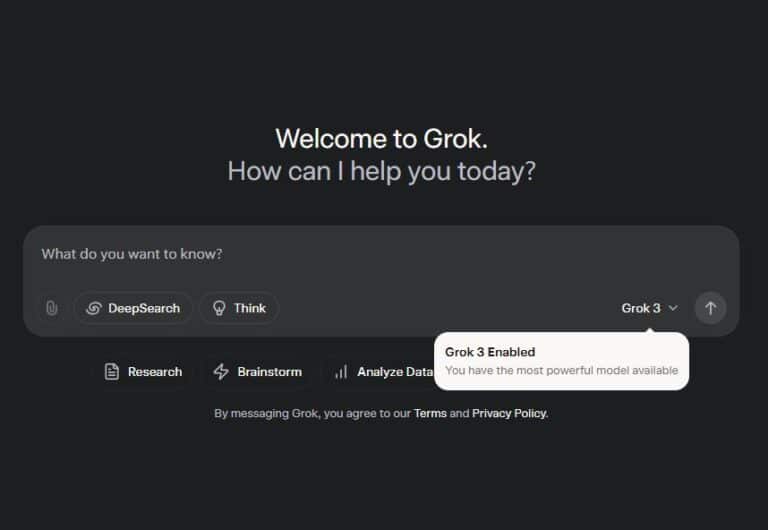Elon Musk’s AI venture, xAI, has drawn attention not only for its technological ambitions but also for the name of its chatbot—Grok. While the name may seem unusual at first, it carries deep significance, stemming from classic science fiction and Silicon Valley’s long tradition of borrowing from literature.
More than just a label, ‘Grok’ represents a vision for artificial intelligence that moves beyond computation and pattern recognition toward ‘genuine’ understanding.
When Elon Musk’s artificial intelligence startup xAI introduced its chatbot, Grok, the selection of its name carried weight. The word ‘grok’ is not a recent invention; it first appeared in Robert Heinlein’s 1961 novel Stranger in a Strange Land. In that story, a human named Valentine Michael Smith, raised on Mars, uses the word to describe a deep and all-encompassing understanding—something that goes beyond simple recognition or comprehension. To ‘grok’ something is to merge with it, to internalize it so completely that it becomes part of one’s very being.
This unique linguistic creation has since found its way into technological and programming communities, where it has become shorthand for an intuitive grasp of complex systems. Unlike traditional learning, which often relies on rote memorization or systematic analysis, to ‘grok’ something means to absorb it in an almost subconscious way, where knowledge is seamlessly integrated into one’s thoughts and actions.
Musk’s Sci-Fi Inspiration and xAI’s Mission
Elon Musk has long expressed his fascination with science fiction, and Heinlein’s works hold a special place in his intellectual development. Musk has cited Heinlein as a key influence on his thinking and even received the Heinlein Prize in 2011 for contributions to space technology, calling it one of the most significant honors he had ever received. Given this background, the choice to name his AI model Grok was more than a whimsical reference—it was a declaration of intent.
By invoking ‘grok,’ xAI is signaling that its artificial intelligence is designed to do more than process data and generate responses. The goal is for Grok to understand human communication, behavior, and culture in a way that mirrors true cognition. While AI models traditionally operate by analyzing patterns and making predictions, Grok is intended to take this further—absorbing context, refining insights, and exhibiting a depth of awareness that distinguishes it from its predecessors.
More Than a Word: The Implications of ‘Grok’
Heinlein’s concept of ‘grokking’ implies a level of immersion where the observer and the observed become one. This notion extends beyond academia and science fiction into the realm of artificial intelligence. Musk’s ambitions for xAI suggest that he envisions a future where AI is no longer a passive tool but an active participant in the human experience.
Understanding at this level is no small feat. Human cognition involves an intricate mix of emotional intelligence, sensory perception, and cultural awareness—all elements that traditional AI struggles to replicate. However, with access to vast real-time data streams from Musk’s various enterprises, including X (formerly Twitter), Tesla vehicles, and Starlink satellites, Grok has a unique foundation upon which to build its knowledge.
Silicon Valley and Science Fiction: A Symbiotic Relationship
Silicon Valley has a long tradition of drawing inspiration from science fiction. Many widely used technological terms—including ‘avatar,’ ‘metaverse,’ and ‘cyberspace’—originated in speculative fiction before entering mainstream discourse. Musk’s choice to name his AI Grok follows in this tradition, tapping into a literary and cultural history that has long informed technological innovation.
The resonance of science fiction in the tech world is not accidental. Sci-fi stories often imagine futures shaped by advanced technology, where artificial intelligence, space travel, and cybernetics redefine human existence. By naming its AI Grok, xAI is positioning itself within this narrative, suggesting that its chatbot is not just another digital assistant but a step toward something more profound—an AI that moves beyond mechanical interactions to achieve true understanding.
The Competitive Edge and Future of Grok
Grok enters an AI landscape dominated by competitors such as OpenAI’s ChatGPT, Google’s Gemini, and Meta’s Llama. While these models have already made significant inroads, xAI’s approach is distinct. The real-time data advantage provided by Musk’s ecosystem of companies means Grok has access to an unparalleled reservoir of human-generated information.
Additionally, as xAI integrates Grok into autonomous vehicles, robotics, and other AI-driven applications, its potential will expand far beyond simple chatbot functionality. Grok could eventually power smart assistants, self-learning systems, and AI-driven decision-making tools across industries. This deep connectivity between AI and real-world data sources positions Grok as an evolving entity—one that, true to its name, doesn’t just compute information but assimilates it in a way that mimics human cognition.
The Name as a Symbol of AI’s Next Evolution
The selection of ‘Grok’ as the chatbot’s name reflects an aspiration that extends beyond branding. It embodies the idea that AI should move from mere processing to holistic understanding. Musk’s history with science fiction, combined with his vision for AI, suggests that xAI’s chatbot is more than a tool—it is a step toward a new paradigm in artificial intelligence.
While the technology has yet to reach Heinlein’s vision of a being that fully merges with knowledge, xAI’s Grok is poised to push the boundaries. If it succeeds, the word ‘grok’ will not just reference a science fiction novel—it will represent the dawn of AI that truly understands the world.
If you are interested in this topic, we suggest you check our articles:
- AI Chatbot Assistant for Business – Friend or Foe?
- Generative AI: Deep Dive on What It Is and How it Can Be Used
- Beyond Bard: The Power of Google Gemini
Sources: Stranger in a Strange Land – Wikipedia, The Economic Times, Mashable, Prospect
Written by Alius Noreika

